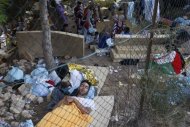 The survivors of a shipwreck off Sicily two days ago live in terrible
conditions and face criminal prosecution, a delegation of lawmakers and
officials said on Saturday as they called for policy changes at home
and in the European Union.
The survivors of a shipwreck off Sicily two days ago live in terrible
conditions and face criminal prosecution, a delegation of lawmakers and
officials said on Saturday as they called for policy changes at home
and in the European Union.
Rough seas again blocked efforts to recover the bodies trapped inside a boat that sank on Thursday, killing an estimated 300 Eritrean and Somali men, women and children who were seeking a better life in Europe.
Rescue teams expect to find more than 100 others in and around the wreck, submerged in 47 metres of water less than a kilometre (0.6 miles) from the shore of the southern island of Lampedusa.
Now the plight of the 155 survivors of one of the worst disasters in Europe's immigration crisis is putting a spotlight on the shortcomings of the centres that house newly-arrived migrants, and on the laws that are aimed at keeping them away.
"We have the duty to tell the Italian government and the EU that their structures and policies are not only inadequate, but they're criminal," said Rosario Crocetta, Sicily's regional governor, after visiting Lampedusa's immigration centre with the mayor and a group of lawmakers.
The centre, which is equipped to house 250 people, is now packed with more than 1,000.
Reporters and TV cameras are kept out, but clearly seen through the front gate were families with children camping under a stand of shade trees, with foam mattresses for beds and clothing drying on lines stretched between the trunks.
"It's indecent," said Tommaso Curro, a lower house deputy for the 5-Star Movement.
"The overcrowding is inhuman," said Gea Planeta Schiro, with the Civic Choice party. "More than 100 woman are using one bathroom, and they have no soap to wash their clothes."
The lawmakers said they spoke to a group of the survivors of Thursday's shipwreck, and were told that each migrant paid thousands of dollars to smugglers first to cross the Sahara desert, and then to buy passage across the Mediterranean.
Lampedusa, a tiny fishing and tourist island that is only about 70 miles from Tunisia and 170 miles from Libya, has borne the brunt of a crisis which over the years has seen tens of thousands of migrants arrive in rickety and unsafe vessels.
ILLEGAL
Abdul, a 16-year-old Somali boy wearing shorts and a red T-shirt, said his father paid a total of $7,500 to smugglers to get him to Lampedusa, where he arrived on a boat 12 days ago - about six months after leaving Mogadishu.
Human trafficking is a lucrative business that exists because of the strict laws aimed at keeping unwanted immigrants out of more wealthy countries.
Abdul's father paid $1,300 to get him across the Sahara, $300 to get him out of a Libyan prison, $800 for each boat crossing, of which he bought four because he was turned back three times by Libyan police, who shot at him, he said.
"I want to study. I want a future," he told Reuters through the bars of the immigration centre gate.
The survivors of Thursday's shipwreck could be prosecuted, fined 5,000 euros and sent home if they are not given political asylum, Agrigento prosecutor Ignazio Fonzo told Reuters.
"There have been some convictions in the past, and of course they can't pay the fine. They don't have any money," he said.
"This shows that one of next things that Italy's parliament must do is abolish the measure that makes immigration a crime," Mario Marazzitti, a lawmaker for the Civic Choice party, told reporters.
The disaster has renewed pressure from Italy for more help from the EU to combat the decades-old migrant crisis in the Mediterranean.
Prime Minister Enrico Letta's centre-left Democratic Party called for an urgent meeting of the European Council to agree on setting up special "humanitarian corridors" to provide protection for migrant boats.
On Saturday, French Prime Minister Jean-Marc Ayrault called for an EU meeting over the death of migrants off Sicily.
"It's a terrible tragedy. It is important that European policymakers meet soon to discuss this together," he told reporters during a visit to the French city of Metz.
THE DEAD
The survivors of the boat disaster who wish to pay their respects to the dead who have been recovered will attend a ceremony later on Saturday in the airport hangar where the 111 coffins lie in rows on the floor.
Most of the caskets are brown, but the four children lie in white ones, with teddy bears and flowers placed on top.
Some in Eritrea have requested that their family members who drowned be returned home for burial, Laura Boldrini, president of the lower house, told reporters. Some of the survivors are also helping to identify the dead, she said.
On Saturday morning, a warm southerly wind whipped spray over the bows of 10 fishing boats that took a wreath into the choppy waters where the tragedy took place.
"Lampedusans are sensitive people," fisherman Vincenzo Partinico, 49, told Reuters. "We made this gesture because we are suffering for those who died, because we are all human beings."
No comments:
Post a Comment